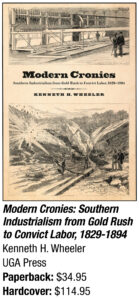 “Modern Cronies” traces how different industrialists shaped the development of the southeastern United States within the context of the southern gold rush. Existing historical scholarship views the gold rush as a self-contained blip that—aside from a supply of miners to California in 1849 and the terrors of the Cherokee Removal—had no other widespread impacts. In fact, the gold rush was a momentous force in both regional and national history.
“Modern Cronies” traces how different industrialists shaped the development of the southeastern United States within the context of the southern gold rush. Existing historical scholarship views the gold rush as a self-contained blip that—aside from a supply of miners to California in 1849 and the terrors of the Cherokee Removal—had no other widespread impacts. In fact, the gold rush was a momentous force in both regional and national history.
The pressure for Cherokee Removal—brought by the gold rush—opened the trail of the Western and Atlantic Railroad, the catalyst for the growth of both Atlanta and Chattanooga, Tennessee. Iron makers who were attracted by the allure of the gold rush, built the most complex iron-making operations in the Deep South near this railroad, in Georgia’s Etowah Valley. Some of them became the industrial talent in the unseasoned postbellum Birmingham, Alabama. “Modern Cronies” elucidates the associations and interconnections spread across a plethora of industries by interpreting the southeastern states’ development.
The book also reevaluates the meaning of Joseph E. Brown, Georgia’s influential Civil War governor, who was nurtured by people who celebrated banking, industrialization, land speculation, mining and railroading in the Etowah Valley. Author Kenneth H. Wheeler explicates Brown’s social, familial and religious ties to these people, while also illuminating his interest in convict labor and showing how he used knowledge and networking during the gold rush as a means of personal growth. After the Civil War, Brown dominated and modeled a crony capitalism with sweeping effects.







